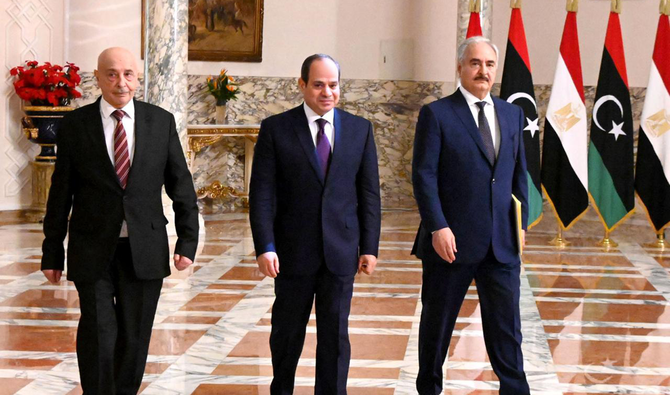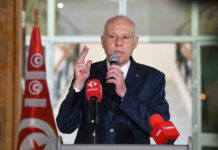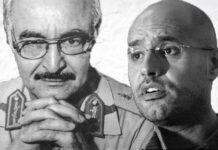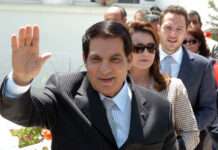Cairo is betting again on the Libyan army commander, Field Marshal Khalifa Haftar, in the upcoming elections. This is after Turkey’s insistence on maintaining its military forces in Libya, and the growing threat of militias to stability in the country.
The Egyptian government intensified its interest in the commander of the Libyan army, Field Marshal Khalifa Haftar, after making sure that Turkey did not fulfill previous pledges to it to withdraw its military forces from Libya, and the inaction of the executive authority in Tripoli in the face of militias and its tendency to postpone the elections. Therefore, for Cairo, Haftar could be a suitable option in the upcoming elections.
Field Marshal Haftar held meetings with officials in Cairo on Wednesday to discuss political developments, and to attend the graduation ceremony of a number of Libyan officers at the Military Academy in Cairo, a sign that confirms the keenness to strengthen the army under his military command.
It is assumed that Haftar’s visit precedes the Libyan Political Forum that Cairo intends to host at the end of this week, with the participation of various parties who were present at the Second Berlin Conference on June 23, 2021.
It is also likely that the visit of the US Special Envoy to Libya Richard Norland to Cairo on Tuesday and Wednesday aimed to hold a meeting with Field Marshal Haftar and consult with officials in Egypt, to untie the successive political crises and create an opportunity to reach a consensus that guarantees the holding of elections on time before the end of this year.
Norland’s visit comes as part of US efforts not to postpone the parliamentary and presidential elections, and to search for necessary settlements to find a solution to the dispute over the constitutional base and the legal framework required for holding the elections on the twenty-fourth of next December.
The mercenary file is one of the issues that were included on the agenda of the Cairo talks between Haftar and Norland, because many parties are convinced that the executive authority in Tripoli deals with this file with a kind of indolence and weakness, in addition to its loyalty to Turkey, which seeks to shake confidence in the various parties. This requires further consultations on how to resolve the current situation.
Haftar’s visit to Cairo came three days after Turkey confirmed its insistence on the continued presence of its military forces in Libya and its adherence to the non-exit of mercenaries, and sent a strict message by Turkish Defense Minister Hulusi Akar in which he stressed that his country’s forces will not leave Libya.
It seems that Haftar’s meetings in Cairo with Egyptian officials, Norland, and some prominent Libyan personalities residing in Cairo are aimed at confronting the obstacles facing the political process, in light of the clash between the centers of power in Libya, in addition to avoiding the possibility of postponing the elections.
These meetings are based on the belief that Field Marshal Khalifa Haftar is concerned with the political reality, as he and the Libyan army are part of the political process, and he may be one of the possible candidates in the upcoming elections.
It is also noted that Egypt is working to bring the different parties closer together by virtue of its openness to many powers, as it is trying to maintain a degree of consensus between Haftar and the current transitional executive authority. The Egyptian leadership is aware of the existence of parties that do not see an interest in holding the elections on time.
The forces of political Islam in Libya are working to put obstacles in the way of holding the elections on time, so they aimed their arrows more than before at Haftar to cut off his chances of running for the position of President of the Republic, and were keen to set harsh conditions that did not apply to him.
The Speaker of the Libyan House of Representatives, Aguila Saleh, is currently in Cairo, and is participating in political consultations and is also holding meetings with various parties, to determine how to deal with the faltering electoral process and its expected scenarios.
The Prime Minister of the National Unity Government, Abdel Hamid al-Dabaiba, may visit Cairo soon, to hold discussions on the crisis situation and to try to find formulas that guarantee facilitating the path ahead of the elections.
Promoting the political process, completing the roadmap, focusing on how to pressure Turkey to withdraw foreign mercenaries from Libya, as well as ensuring that no national figure is disqualified from running for elections — these are all goals of active US diplomatic moves in cooperation with Cairo.
Also, the visit of Haftar and Norland comes in conjunction with deep and sharp discussions about the constitutional base, in light of the insistence that no parties be given the opportunity to exclude certain personalities as long as they meet the legal and constitutional conditions.
The Libyan Political Dialogue Forum began its meetings organized by the United Nations in a virtual session on Wednesday, to discuss the constitutional basis for holding the elections next December.
Washington supports the right of the Libyan people to choose their leaders through a free and fair democratic process, and calls on key figures to use their influence at this crucial stage, praising the importance of the role played by Field Marshal Khalifa Haftar in unifying the army.
Cairo also played a role in the process of unifying the Libyan army, and Washington wants it to resume contacts on this matter. Overcoming this problem opens the way for more pressure to weaken the justifications for the presence of Turkish forces and armed gangs in Libya. Cairo’s role also ensures that the elections are held on time and that their results are implemented.
During his visit to Cairo, Haftar will meet with Libyan personalities residing in Egypt, most of whom belong to the regime of Colonel Muammar Gaddafi, to feel their pulse and obtain their support for his candidacy for the position of President of the Republic in the elections, especially after the emergence of Saif al-Din Gaddafi in the political scene recently and the division over his support as a possible candidate and as a representative of the old regime.
Haftar is trying to emphasize his national role and reduce the dispute over his being a military man whose goal is to gain power at any cost. He is benefiting from the lack of a charismatic figure around whom Libyans gathered and unite.
On Monday, on the occasion of the 81st anniversary of the founding of the Libyan army, Haftar said that the army is extending hand for peace, overcoming the differences that led to the armed confrontation in the country, noting that the army forces “will not be under any authority to circumvent civilian slogans.”











